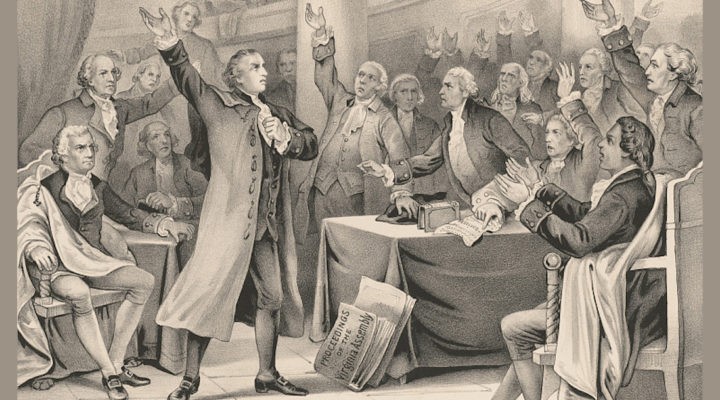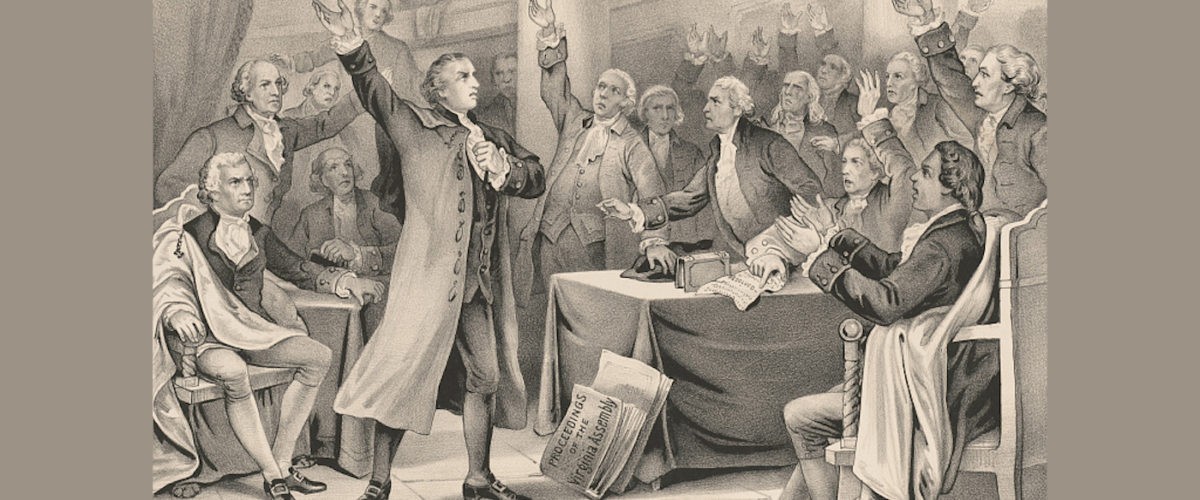He stood up to address the House of Burgesses, the legislative body in Virginia, meeting to determine how to respond to British military intervention in the colony. Relationships between the colonists and the British had deteriorated over the past two years. Six months earlier, in September 1774, the first United States Congress met in Philadelphia and debated the subject for seven weeks.
The purpose of the convention in Virginia was to consider the Philadelphia congressional decision and formulate their own response. At the end of his speech, Patrick Henry said these words: “Is life so dear, or peace so sweet, as to be purchased at the price of chains and slavery? Forbid it, Almighty God! I know not what course others may take; but as for me, give me liberty or give me death!”
Addressing “Almighty God,” Henry declared the words we all learned in grade school: “Give me liberty or give me death.”
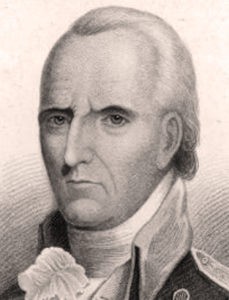
John Stark
Thirty-four years later, Gen. John Stark, the most famous Revolutionary War soldier from New Hampshire, expressed a similar sentiment, “Live free or die: Death is not the worst of evils.” The words were not original to Stark. This was a popular expression during the French Revolution.
There is no doubt the fathers of our country were motivated by their desire for freedom. It’s a concept that resonated deep in the heart of Americans as well as many others around the world. Not only do Americans enjoy freedom, thousands of others from other countries come to our borders every year in a quest to possess this same freedom.
It will do us well to examine this concept of freedom. The dictionary definition of freedom is “the power or right to act, speak or think as one wants without hindrance or restraint.” Obviously, this freedom doesn’t apply to anyone lower on the hierarchy than God. Therefore, all of us learn to live with restraints on our freedom. We don’t jump in the car and drive without restrictions; we don’t shop without acceptable attire (at least most of us); we follow countless rules for almost every activity. There is no such thing as complete freedom.
Since we can’t have complete freedom, we pick and choose the freedoms that are important to us. Go back and read the quote from Patrick Henry from his famous speech. He defined liberty as a contrast between “chains and slavery.” He preferred “death” to living in chains and being a slave. Many would agree with that position. Notice that he did not say, “Let me shop at Walmart in my birthday suit or give me death.”
“That’s the way most of us are. We want our freedom, but we have little concern for the freedom of others.”
One of the ultimate ironies of history is that when he died, Patrick Henry stipulated in his will that ownership of his 67 slaves was to be divided between his wife and sons. Apparently, Patrick was willing to die for his own freedom but not so much for the freedom of others.
That’s the way most of us are. We want our freedom, but we have little concern for the freedom of others.
- We want the freedom to refuse to bake a cake for a gay wedding, but we don’t want gay people to have the freedom to marry.
- We want the freedom to control our bodies and not take a vaccine, but we don’t want pregnant women to control their bodies.
- We want freedom of religion and to have prayer in school, but we don’t want a Muslim to have the freedom to lead the prayer.
- We want to celebrate our freedom with flags and parades, but we don’t want immigrants from other countries to cross our borders.
We’re not really advocating for freedom; we gave that up a long time ago. As long as we live in a community, in a civilized society, we cannot have complete freedom. Civilization requires rules, and rules limit freedom. What we really want is to have our own way, to be able to decide how we want to do things.
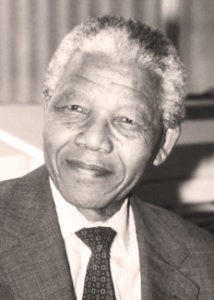
Nelson Mandela
A civilized society works out rules and regulations to limit and control freedom for the good of the whole, not necessarily each individual. Nelson Mandela said, “To be free is not merely to cast off one’s chains, but to live in a way that respects and enhances the freedom of others.” The greatest freedom we possess is the freedom to be a part of our community, to live among others without suffering unjustly.
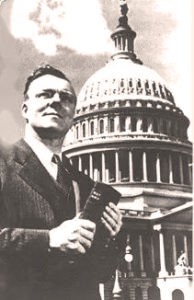
Peter Marshall
Senate Chaplain Peter Marshall said, “May we think of freedom, not as the right to do as we please, but as the opportunity to do what is right.” If you have read any of Peter Marshall’s writing, you’re aware that he was familiar with the Apostle Paul. Writing to the Corinthians, Paul provided a list of his freedoms — the right to eat and drink, to take along a believing wife, to refrain from working, and to be supported by the church (1 Corinthians 9:3-8). Although he was free to do and have these things, listen to what he said: “We did not use this right, but we endure all things so that we will cause no hindrance to the gospel of Christ” (1 Corinthians 9:12).
Later, he states more clearly: “For though I am free from all people, I have made myself a slave to all” (1 Corinthians 9:19). He was free, but he was not enslaved to freedom.
I titled this article “Enslaved to Freedom” because that is the condition of many people. They are ruled and controlled by their quest for freedom. This is evident in the midst of the pandemic. People refuse a life-saving vaccine and a mask because they are free to do so. They don’t do it because it is for their advantage. Millions already have died from the virus, yet they take no precautions. Unless they are stupid, people know it is not beneficial to do nothing to avoid COVID. The deadly virus doesn’t respect their freedom.
Recent studies reveal that the virus is dividing according to political lines. States that lean toward Republicans have the most cases and deaths, and they also have the lowest vaccination percentage and the highest resistance to wearing masks. It’s no secret that Republicans have led the charge to do nothing about the virus with the claim they were asserting their freedom.
“What they are saying is that they are free to do nothing to stop a deadly virus, or if I may paraphrase Patrick Henry, ‘Give me liberty or give me a vaccination.'”
What they are saying is that they are free to do nothing to stop a deadly virus, or if I may paraphrase Patrick Henry, “Give me liberty or give me a vaccination.”
The part I don’t understand is why people are making a medical decision based on their politics. I realize politics impacts every area of life, but this makes no sense. We have doctors to guide us concerning medical matters. Why would you allow your governor to give you medical advice?
To decide about the vaccine, contact the same person you would call if you had a heart attack, or your child broke her arm, or your father had a stroke. We all mess around with YouTube or WebMD when we have a symptom of something, but when it’s a life-or-death issue, we call our doctor. Did they miss the part about COVID being a life-or-death issue? Ask the families of the 700,000 Americans who have died in the past year and a half.
Many are so enslaved to the notion of maintaining their freedom that they can’t even do something that’s good for them. They come up with excuses, but none of them carry any weight. The claim that the government is using the vaccine to implant a tracking bug makes no sense when you’re welded to a cell phone. The fear that the vaccine is untested is baseless since hundreds of millions already have been vaccinated without serious problems.
However, the biggest problem is people insisting on their freedom without regard for the health of others. Freedom not to be vaccinated and to go without a mask puts others at risk. Let’s not forget the words of Jesus himself, “This is My commandment, that you love one another, just as I have loved you. Greater love has no one than this, that a person will lay down his life for his friends” (John 15:12-13).
You’re certainly not willing to lay down your life for a friend if you insist on the freedom not to wear a mask or be vaccinated. Instead of serving Jesus, you are enslaved to freedom.
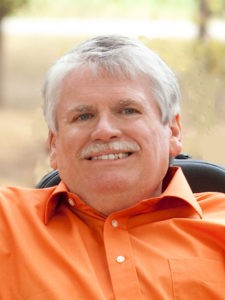
Terry Austin
Terry Austin says from his first day of life he was taught to love the church. He has lived out that passion in various ways as a pastor, church consultant, author and critic. He is currently a full-time writer and book publisher and actively engaged with house churches.
Related articles:
How the Constitution’s original religious freedom guarantee almost didn’t happen | Opinion by Jennifer Hawks
Voices of freedom continue to speak from Colonial Williamsburg church
4 in 10 Americans don’t see getting vaccinated as a way to ‘love your neighbor’

